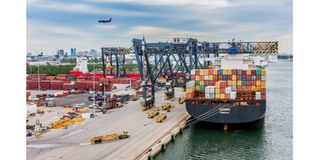Tanzania's ports performance increase as trade recovers

What you need to know:
- According to the Bank of Tanzania (BoT), cargo handling at both sea and lake ports in the country amounted to 19.8 million tonnes in the year to June 2022 from 17.19 million tonnes that were handled in a comparable period the year before
Dar es Salaam. Cargo handled by Tanzanian ports increased by 14.9 percent to 19.8 million tonnes in the last financial year as businesses are rebounding from the Covid-19 outbreak in the wake of improved port infrastructure.
According to the Bank of Tanzania (BoT), cargo handling at both sea and lake ports in the country amounted to 19.8 million tonnes in the year to June 2022 from 17.19 million tonnes that were handled in a comparable period the year before.
The central bank’s consolidated zonal economic performance report for the year ending June 2022 indicates that the improvement of the Dar es Salaam port, which accounts for 90.4 percent of cargo handling continues to pay off.
During the year, the port handled 17.85 million tonnes, a 10.3 percent increase from 16.19 million tonnes that the were handled in the 2020/2021 financial year.
The second-highest cargo volume was handled at the Tanga port that recorded an improvement of 16.9 percent to 942,000 tonnes from 806,100 tonnes in the previous year.
“Increased cargo volume in the ports of Dar es Salaam and Tanga is a result of the global supply chain’s recovery and improvements to the port’s infrastructure,” the central bank stated in the report.
Mtwara Port recorded the highest improvement with cargo volume more than doubled to 592,400 tonnes by year-end in June 2022 from 177,400 tonnes in 2020/2021.
This, according to the central bank, was because of an increase in the shipment of cashew nuts and coal.
“The increase in the volume of cargo in Mtwara Port resulted from increased exportation of coal to the Netherlands, Senegal, Ghana, Egypt and India, and cashew nuts to Vietnam coupled with the importation of petroleum products,” the bank read in part.
Tanzania is home to hundreds of formal and informal ports on the Indian Ocean and lakes, but the Tanzania Ports Authority (TPA) only oversees about 90 of them, and there are over 600 unofficial ports that operate.
The East African nation, which sits on the Indian Ocean, serves the neighbouring countries of Rwanda, Uganda, Burundi, the Democratic Republic of the Congo (DRC), Zambia and Malawi to export and import goods through the port of Dar es Salaam.
In a phone interview by The Citizen, the Tanzania Ports Authority (TPA) director general, Mr Plasduce Mbossa, said economic recovery and government efforts to encourage business and investment are among the key factors that continue to support the performance of the ports.
He said that includes the comeback of economic activities like agriculture, manufacturing, mining and return of investors’ activities both in Tanzania and across the region - specifically from the landlocked neighboring countries.
“Handling of minerals, fertilisers and raw material within the country and from neighbouring countries has substantially improved as supply chains recover,” he said.
Recent data by the TPA had shown that while the volume of cargo had reached a four-year high to a centre port in Dar es Salaam, DRC is the largest customer followed by Zambia.
The biggest cargo volume from the lakes ports was handled by Kigoma port at Lake Tanganyika with 179,500 tonnes, followed by Mwanza port at Lake Victoria with 139,500 tonnes. Senior economics lecturer at the University of Dar es Salaam, Dr Wilhelm Ngasamiaku, said the impressive performance of the ports has a substantial role in the growth of the domestic economy. The country must, however, ensure that the ports’ full potential is harnessed to sustain their contribution to the gross domestic product (GDP).
“The port sector contributes almost half the GDP in some countries. By looking at our ports against other similar ports across the world and seeing if there is room for improvement, we can improve even further,” he said.
“Using our ports more efficiently can facilitate our budgetary needs and support some of our financial needs,” said Dr Ngasamiaku.




